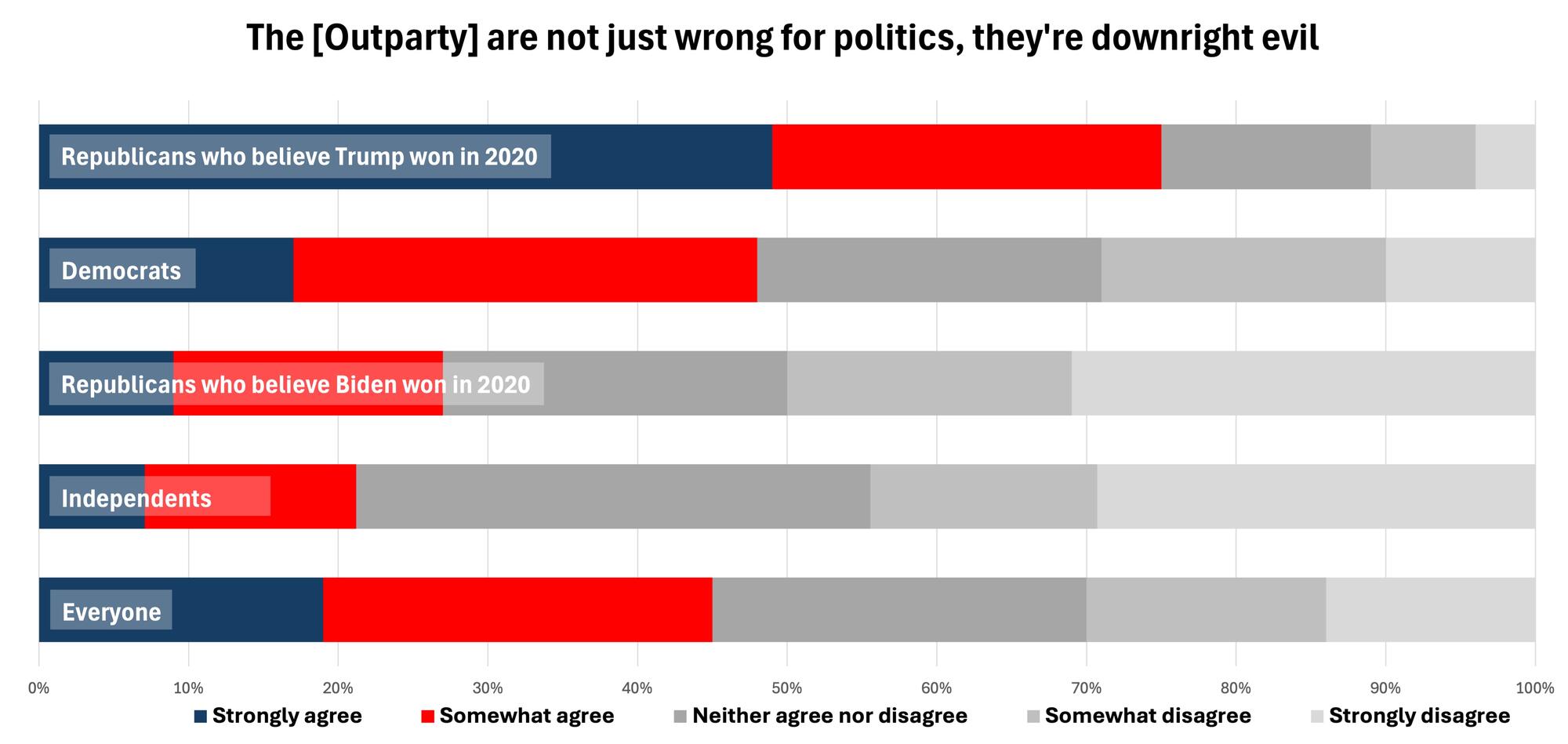
Nearly half of the U.S. electorate thinks members of the opposing party aren’t just wrong for politics—they’re downright evil, according to new polling data from the SNF Agora Institute at Johns Hopkins University.
Three-quarters of Republicans who still believe Trump won the presidential election in 2020
“somewhat agree” or “strongly agree” that Democrats are “downright evil.” Only 27% of Republicans who think Biden won in 2020 agree with the sentiment. Meanwhile, less than half of Democrats consider Republicans evil.
“Vilifying our political opponents is a signal that we consider them to be enemies instead of opponents,” said Lilliana Mason, a Johns Hopkins University political science professor who studies political violence and polarization. “The work of governing a democracy requires compromise and mutual respect. These sentiments make that respect nearly impossible, which threatens the health of democracy.”

Mason and Scott Warren, who co-led the project at the SNF Agora Institute, commissioned the poll as part of an effort to better understand the U.S. electorate leading up to the 2024 presidential election. They worked with YouGov, a polling and data company based in the United Kingdom, to survey eligible voters. The poll is the second of four scheduled panel interviews to survey the same group of respondents. The first poll was conducted from July 26 to July 30, and the second one from Sept. 6 to Sept. 18.
Respondents answered questions about their party affiliations, their political identities, the 2020 election results, where they get their information, and what they think about people from other parties. Findings are based on survey answers from 2,000 respondents who make up a demographically and politically representative sample of the U.S. electorate.
Vice President Kamala Harris has gained three points, with the percentage of respondents who would vote for her increasing from 43% to 46% since July; the percentage who would vote for former President Trump stayed at 42%. The results, the researchers noted, may differ from other national polls because the data is not passed through a likely voter screen, weighted to any prior election results, or weighted to match a likely voter profile.
The poll examined voters’ attitudes toward women and minorities in an election featuring a candidate who is the nation’s first female and biracial vice president.
Data from the two surveys suggests a growing divide between Republicans known as “election deniers” and the rest of the electorate, the researchers said, especially around issues of gender and race.
“2020 election denialism has become an identity issue as much as a substantive policy measure. Republicans who do believe in the results of the 2020 election have strikingly pro-democracy viewpoints and may feel that they don’t have a political home at this moment in time. Figuring out how to include them in our democracy is critical at this moment,” said Warren, an SNF Agora fellow.
Republican election deniers are less likely to think a woman should be president, the data suggests, with 28% believing women are better suited to take care of a home than to work a job, compared to 21% of independents, 20% of Republicans who believe Biden won in 2020, and 17% of Democrats.
Additionally, most election deniers—more than 80%—“strongly agree” or “somewhat agree” that Black Americans should overcome prejudices and work their way up “without any special favors” in the same way “Irish, Italian, and Jewish ethnicities” once did.
When asked about which issues most motivate them during voting, election deniers and Republicans who believe Biden won in 2020 prioritize the economy, immigration, and crime. Democrats say they care most about abortion, the economy, and democracy. And independents rank the economy, immigration, and abortion as their top issues when casting their votes in November.
Other findings include:
- Poll respondents have grown more worried that the opposing party will not accept the outcome of the election if they lose in November; overall, more respondents trust Democrats to concede the election if they lose than Republicans.
- One-quarter of respondents are not sure Democrats will concede the election if they lose, up from 23% in July. And 36% of respondents are not sure Republicans will concede the election if they lose, up from 34% in July.
- Half of respondents think Democrats will accept the outcome if they lose, while only 26% think Republicans will do the same.
- Fewer Republicans and Democrats think it’s important to accept the outcome of the election regardless of the winner.In July, 91% of Republicans who believe Biden won in 2020 said they believe it’s important to accept the outcome of the election even if their preferred candidate loses. Roughly two months later, the number is 85%. Fewer Republican election deniers and fewer Democrats believe the same, with their numbers dropping from 43% to 42%, and 85% to 84%, respectively.
- Fewer people are anticipating political violence after the election. In July, 9% of respondents anticipated no violence after the election; by September, that number had risen to 11%. Additionally, respondents who think there will be “a lot” or “great deal” of violence after the election shrank from 22% in July to 20% in September.
“As we continue this panel research, we observed fairly small changes between our first wave in July and now, indicating a relatively stable electorate,” Warren said. “We’ll be watching to see if there are any changes right before or after the election, when we launch our next panels.”
The third poll will take place just prior to the November general election.


